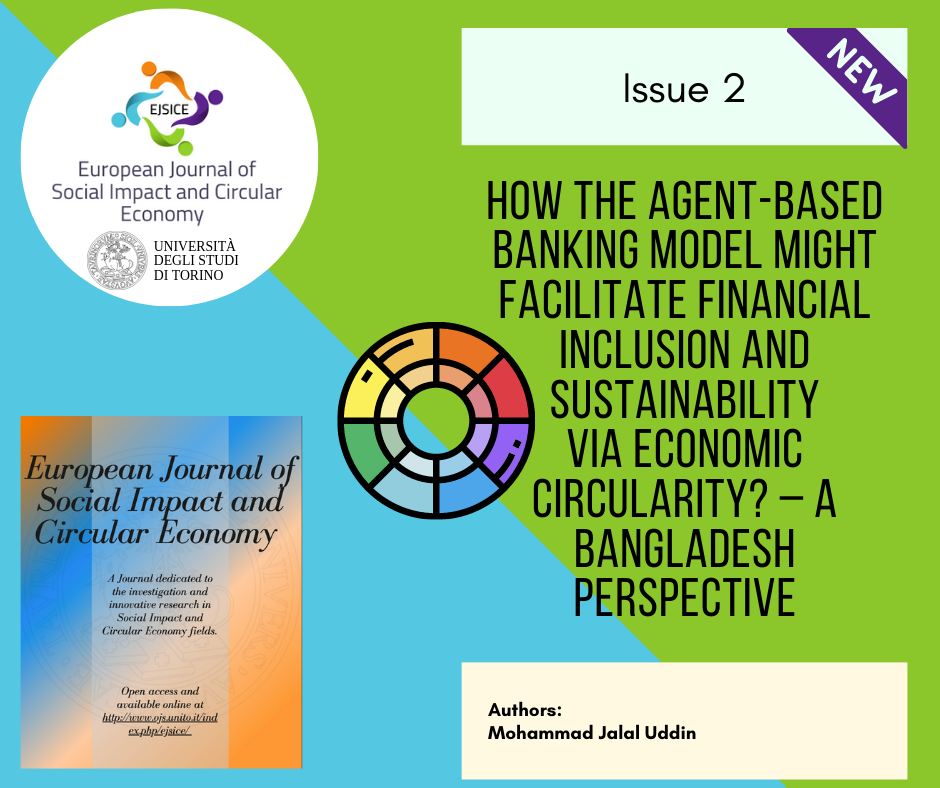How the agent-based banking model might facilitate financial inclusion and sustainability in Emerging Markets and Developing Economies (EMDEs) via economic circularity?
DOI:
https://doi.org/10.13135/2704-9906/4945Keywords:
Agent-based banking model, Circular economy, Financial inclusion, Sustainability, TransformationAbstract
Transformation of business models with the interaction of technological breakthrough, innovation, socio-economic, geostrategic and environmental transition are historical. Context based adjustment of business value chain also not rare. In fact, such adjustment might prove essential to survive in the market at certain point, especially in case of corporate transformation due to economic recession/depression, industry downturn and ecological correction like COVID-19. However, some business models are smart enough to cope with both kinds of transformations. Agent-based banking model is one of such kind, which not only sustains during adverse situation but also facilitates the momentum of adversity. This ultimately defined as a sustainable innovation in banking industry that drives via circular economy. The mode of economic circularity in product and service level or goods and service industry are not identical and while articulating circular business model in service industry, like Banking, than it denotes generating values for broader range of stakeholders and transmitting this value in such a way that minimize the ecological and social costs. How an agent-based banking model might help the conventional banks of Emerging Markets & Developing Economies (EMDEs) toward the business model sustainability, is the centre of this study. This type of inclusion in EMDEs will not only assist to bring the World’s 1.7 billion unbanked adult community into regulated financial system but also facilitate the physically challenged, illiterate & marginal people on financial inclusion and pave the way of global development in a sustainable manner.
References
Andersen M. S. (2007) An introductory note on the environmental economics of the circular economy. Sustain Sci 2, pp. 133–140.
Baptista G., Oliveira T. (2017). Why so serious? Gamification impact in the acceptance of mobile banking services. Internet Research, Vol. 27 Issue: 1, pp.118-139.
Bermúdez V., Schneider M.A. (2018) Challenges of transforming a Business Model to a Sustainable Business Model – A case study based on IKEA and Tetra Pak. School of economics & management, Lund University.
Bhatt A., Bhatt S. (2016) Factors Affecting Customer’s Adoption of Mobile Banking Services. J Internet Bank Commerce 21: 161.
Bocken N.M.P., Schuit C.S.C., Kraaijenhagen C. (2018) Experimenting with a circular business model: Lessons from eight cases. Environmental Innovation and Societal Transitions.
Bocken M.P.N., de Pauw I., Bakker C., van der Grinten B. (2016) Product design and business model strategies for a circular economy. Journal of Industrial and Production Engineering, 33:5, pp. 308-320.
Demirgüç-Kunt, Asli, Leora Klapper, Dorothe Singer, Saniya Ansar, and Jake Hess (2018) The Global Findex Database 2017: Measuring Financial Inclusion and the Fintech Revolution. Washington, DC: World Bank.
Drake L., Hall M.J.B., and Simper R. (2006) The impact of macroeconomic and regulatory factors on bank efficiency: A non-parametric analysis of Hong Kong’s banking system. Journal of Banking & Finance, 30, pp. 1443–1466.
Korhonen J., Honkasalo A., Seppälä J. (2018) Circular Economy: The Concept and its Limitations. Ecological Economics 143, pp. 37–46.
Geissdoerfer M., Savaget P., Bocken N.M.P., Hultink E.J. (2017) The Circular Economy – A new sustainability paradigm? Journal of Cleaner Production 143, pp. 757 – 768.
Panayiotis P. Athanasoglou, Sophocles N. Brissimis and Matthaios D. Delis (2008) Bankspecific, industry-specific and macroeconomic determinants of bank profitability. Journal of International Financial Markets, Institutions and Money 18, pp. 121–136.
Siddik N.A., Sun G., Yanjuan C., Kabiraj S. (2014) Financial Inclusion through Mobile Banking: A Case of Bangladesh. Journal of Applied Finance & Banking, vol. 4, no. 6, pp. 109-136.
Shaikh A.A., Karjaluoto H. (2015) Mobile banking adoption: A literature review, Telematics and Informatics 32, pp. 129–142.
Malar D.A. Arvidsson V., Holmstrom J. (2019) Digital Transformation in Banking: Exploring Value Co-Creation in Online Banking Services in India. Journal of Global Information Technology Management, 22:1, 7-24
Nkiru Patricia-Nezianya Chude and Daniel Izuchukwu Chude (2014) Impact of Agent Banking on Performance of Deposit Money Banks in Nigeria. Research Journal of Finance and Accounting, Vol.5, No.9.
Nefa Chiteli (2013) Agent Banking Operations as a Competitive Strategy of Commercial Banks in Kisumu City. International Journal of Business and Social Science Vol. 4 No. 13.


 EJSICE has been approved for inclusion in DOAJ. The DOAJ listing of the journal is available at
EJSICE has been approved for inclusion in DOAJ. The DOAJ listing of the journal is available at  EJSICE is a member of
EJSICE is a member of  EJSICE is indexed by
EJSICE is indexed by  EJSICE is listed in the ANVUR (Italian National Agency for the Evaluation of Universities and Research Institutes) as a scientific journal in AREA 13 - Economic and Statistical Sciences and AREA 14 - Political and Social Sciences.
EJSICE is listed in the ANVUR (Italian National Agency for the Evaluation of Universities and Research Institutes) as a scientific journal in AREA 13 - Economic and Statistical Sciences and AREA 14 - Political and Social Sciences. 

